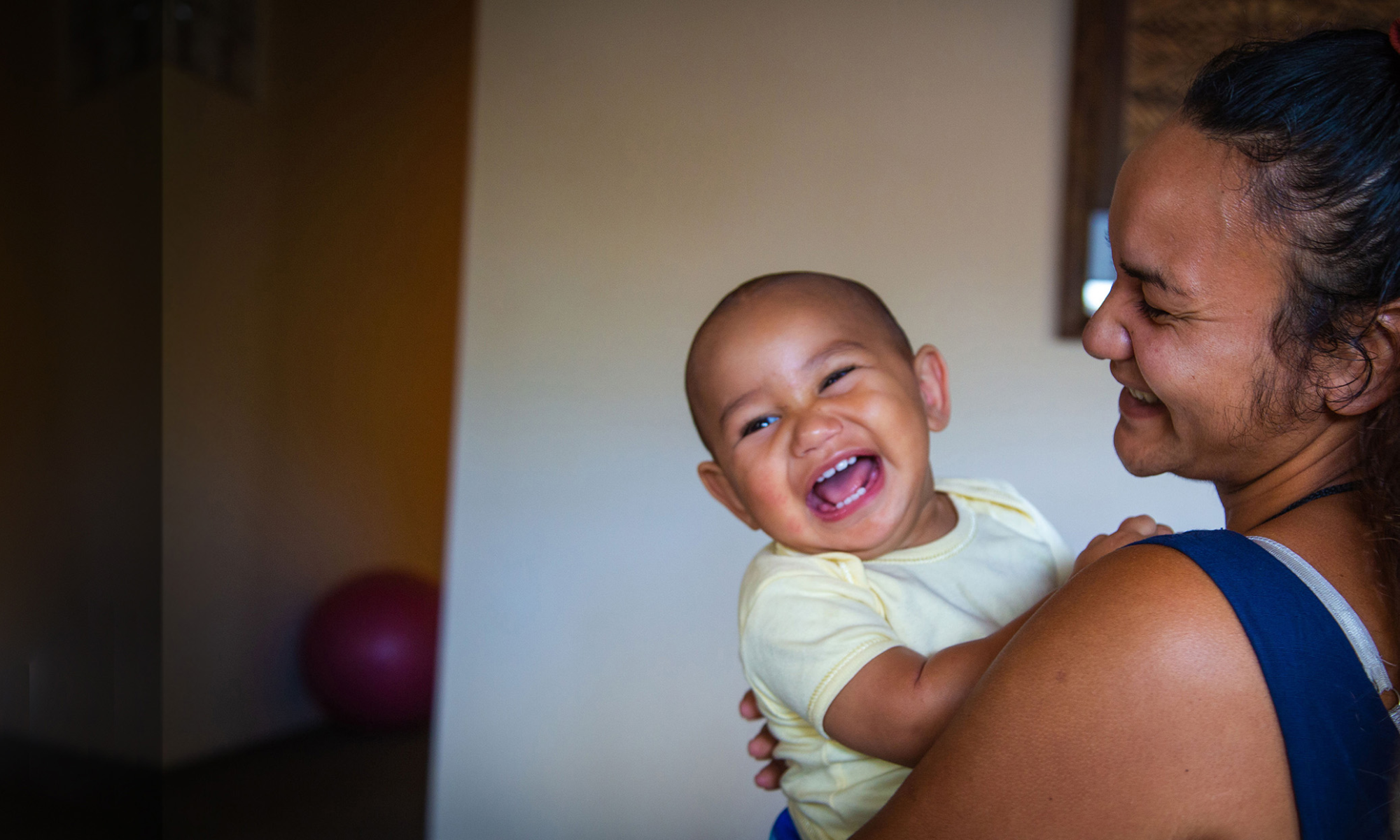About Pēpi Penapena
Pēpi Penapena (Cherish Babies) is a whānau (family) organisation championing the gentle and respectful parenting ways of tūpuna (ancestral) Māori from pre-colonial times.
Pēpi Penapena offers courses to organisations and practitioners that support whānau in social welfare or health settings. The goal of these courses is that graduates will be able to share tūpuna parenting strategies with these whānau to inspire them to parent more like their tūpuna did.
If you want to learn more about Pēpi Penapena's kaupapa, visit their website or one of their social media pages @tupunaparenting.
Getting started with iQualify
Elizabeth Emere Harte (Chief Executive Officer) found iQualify from her Open Polytechnic Accounts Manager, who was supporting her with a media project at the time.
She thought iQualify was a good fit for Pēpi Penapena because it enabled structured online learning for her students, including a range of tasks and embedded media, allowed drip-fed content week-by-week, as well as online discussions for the group.
Elizabeth (Liz) has a technical background so she needed very little help from us, preferring to get stuck into figuring out iQualify by trying things out. If ever she needed to fill in any “how-tos” along the way, she looked up articles in our Knowledgebase. Enabling her to get the answers she needed quickly so she could keep building great learning.
How they’re (currently) using iQualify
Pēpi Penapena currently have a course in iQualify: Ngākau Aroha Parenting. This course is being used by organisations like Whānau Āwhina Plunket, with plenty of other learners choosing to sign up through the Pēpi Penapena website.
Under the headings below, you’ll get to see some of the features of how Pēpi Penapena are using iQualify to work for them and their learners.
Weekly releases to focus learners
Pēpi Penapena’s learners are often completing these courses as professional development on top of their day to day work. So Liz wanted to make sure that learners were not overwhelmed with where to start and what to do.
So she's using the study plan feature, to automatically release new content and activities each Monday morning. Learners then have two weeks to complete content and tasks for that section. This keeps learners focused and engaged on just the content they need, right now.
Clear course structure
The Ngākau Aroha Parenting course also has a clear structure within each week:
- An overview of what to expect in that week
- Videos from experts
- Tasks for practice
- Tasks or discussions to support reflection
- A page explaining what to expect next week to segue into new learning.
Having a clear, repeatable structure really helps learners know what to expect and makes it easy for them to find their way around.
Expert videos to explore ideas
Each week, there is a video from Liz or another expert, exploring a different idea relating to tūpuna parenting.
Using Vimeo to host these videos allows Pēpi Penapena to use high resolution videos and have fine control of access. For instance, should they choose, they can set the videos such that they can only be viewed and played within iQualify. This can be important for partners for a range of legal, privacy, or intellectual property reasons. Alternatively, if offline access is important, iQualify also has the option of recording and uploading your videos in app.
The first few times the course was run, there were weekly online wānanga, but that was very time intensive and involved going over the same content with each new cohort. Shifting the content-delivery part of teaching to recorded videos allowed Liz to drop the wānanga down to every four weeks and focus the wānanga on sharing practice rather than covering content.
Wānanga and hui
Every four weeks, learners and facilitators come together for an online wānanga (using Zoom). The wānanga ask learners to prepare for and participate in discussions about their practice.
The course also includes opportunities to hui (meet and discuss) with kaimahi (staff) who have previously completed Ngākau Aroha. These hui are more relaxed and provide an opportunity for all to share about their experiences sharing tūpuna parenting with whānau.
The wānanga and hui are a great way to humanise online learning and for learners to connect with their facilitators and with each other.
Checking knowledge and showcasing skills
Scenario-based multiple choice questions and matching tasks throughout the course also serve at least triple-duty.
1. They engage learners, offering a change of pace to the videos and more involved reflective tasks.
2. They let learners quickly know if they’re on the right track with automatic marking and feedback.
3. They give facilitators a quick view of who is “getting it” and who might need a bit more support.
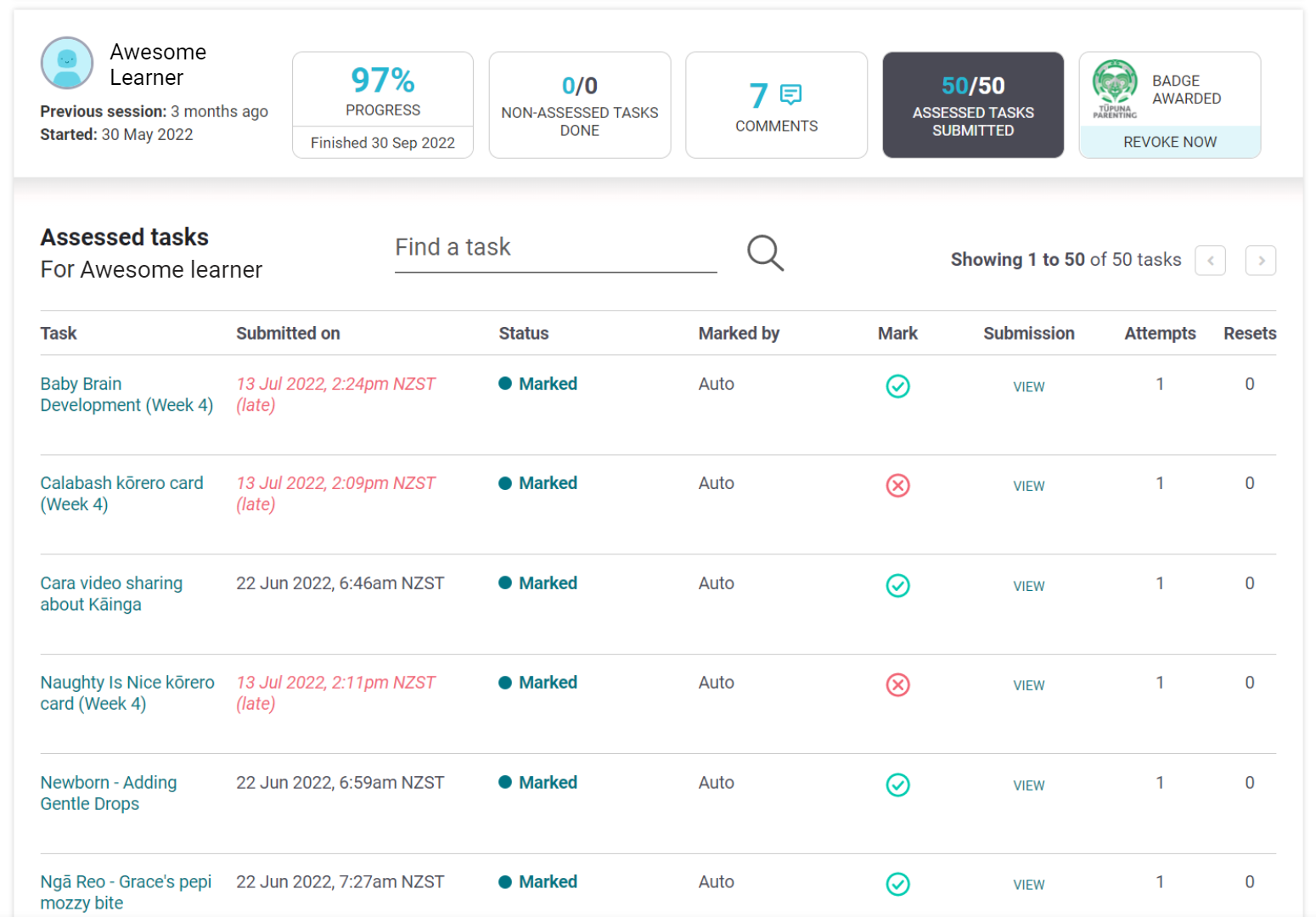
In-page discussions for sharing practice
Throughout the course there are opportunities for learners to share their stories of working with whanau.
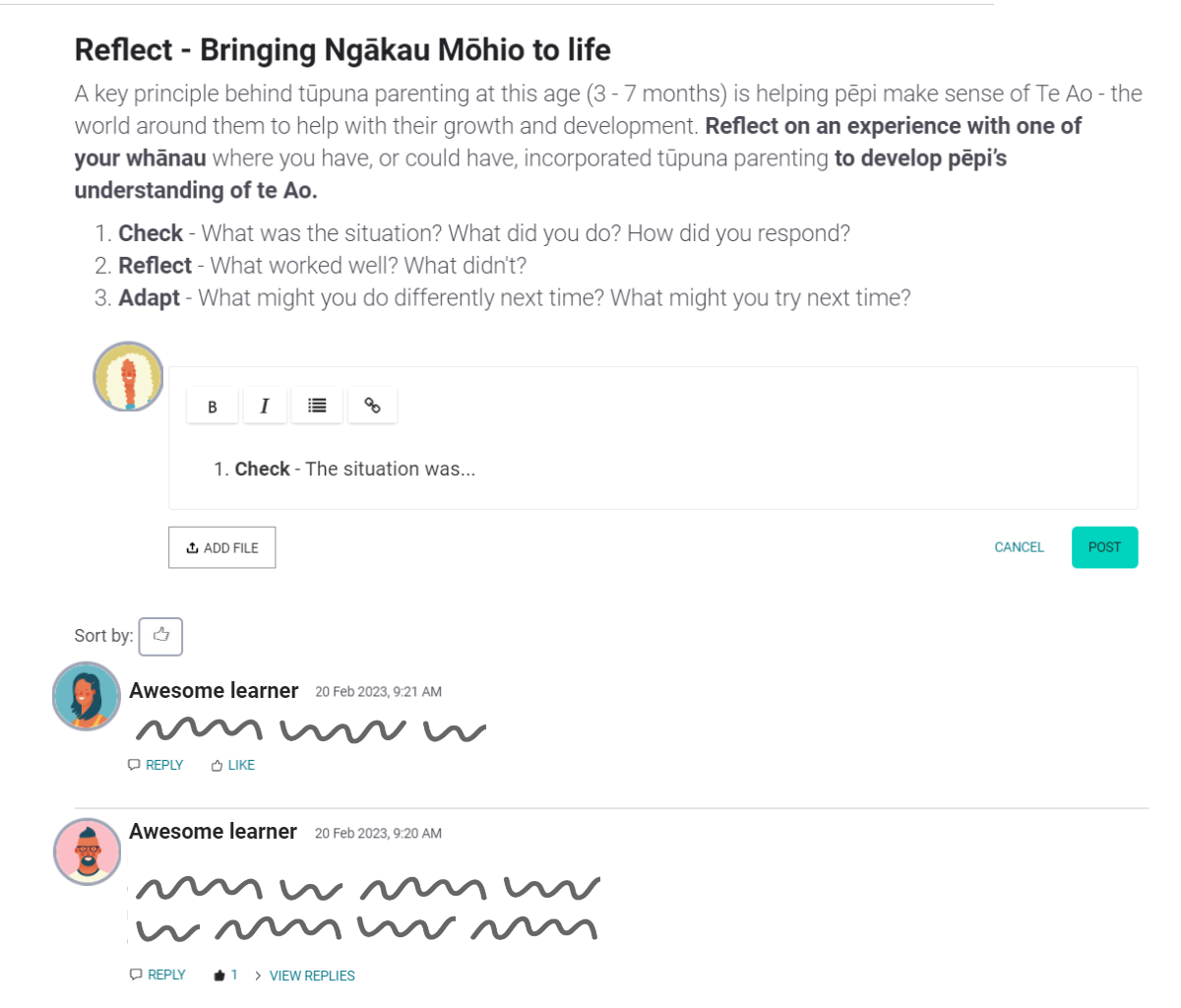
These in-page discussions have a whole host of uses and benefits:
- Learners who aren’t able to make the live wānanga and hui are still able to contribute and see others’ stories, but at a time that works for them.
- They serve as valuable practice for learners assessed self and peer reflection (discussed further below).
- Liz sometimes draws from the in-page discussions as evidence of learners having met the course requirements (if aspects are missing on their final reflection).
Reflective practice and peer tasks
The final tasks in the course ask learners to reflect on their work with families - first on their own, and then with a peer.
Learners first use a check, reflect, adapt framework to draw out aspects of their own reflection. Then, learners come together (physically or virtually) with a peer and share their reflections. The peer takes a listening and non-judgemental role. They prompt the sharer to further unpack examples of supporting families in understanding and using tūpuna parenting strategies. These reflective tasks provide facilitators with great evidence of whether learners have met the learning outcomes for the course.
Acknowledging achievements
After all their hard work, Pēpi Penapena wanted to acknowledge learners’ skills and successes. So, they have used our in-built badges (which comply with the IMS Open Badges 2.0 standard) but have added their own customised design to make the badge really their own.
Once earned, learners can share these badges to celebrate their success on the web via online CVs and social networks like LinkedIn and Facebook, or through special online badge collection services. For Pēpi Penapena this is also a great way to get the word out about their mission.
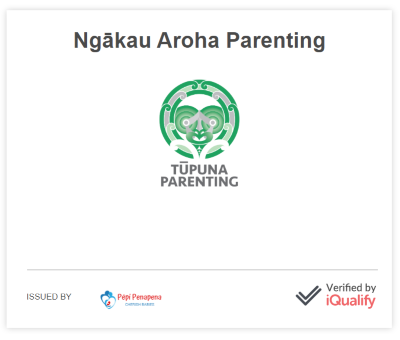
Always learning
We met with Liz after she’d taken a few classes of learners through the Ngākau Aroha course. When I thought back on the conversation with Liz, the theme that really stuck out for me was about learning and continuous improvement. On many levels.
A big part of the course itself is focused on learners’ reflective practice as they engage with whānau - reflecting on how they are able to share and promote tūpuna parenting strategies.
For us, we learned a lot about how our in-page discussions might also need to be “marked” and tracked in the way that tasks are. We also saw a great example of how partners might want to have multiple badges for one course in order to acknowledge different levels of achievement. Lots of great ideas and feedback to take back to our team. Because yes, our partners’ use does inform our development.
Liz herself has already run through a few iterations of the course, improving it with each offering. We mentioned briefly the change from weekly to four-weekly wānanga. But, there have also been some big changes to how the peer reflection task has been run. Initially set up as a suite of essay tasks, it was then changed to two file uploads. Neither was working as well for the learners or facilitators as they ought. Peers submitting their reflections on others’ reflections wound up being difficult to unravel. So, the next time the initial self-reflection file upload remained, but the peer reflection was pared down to a few short specific tasks about their peer’s experience they shared. This removed the confusion and put the focus clearly onto the self reflection, with the peer’s opinion supporting and enhancing that.
Liz also had an end of course survey through Survey Monkey so was able to give us a lot of detail on what her learners were loving the most in the course. She will no doubt use this rich data to inform her next changes to the course.
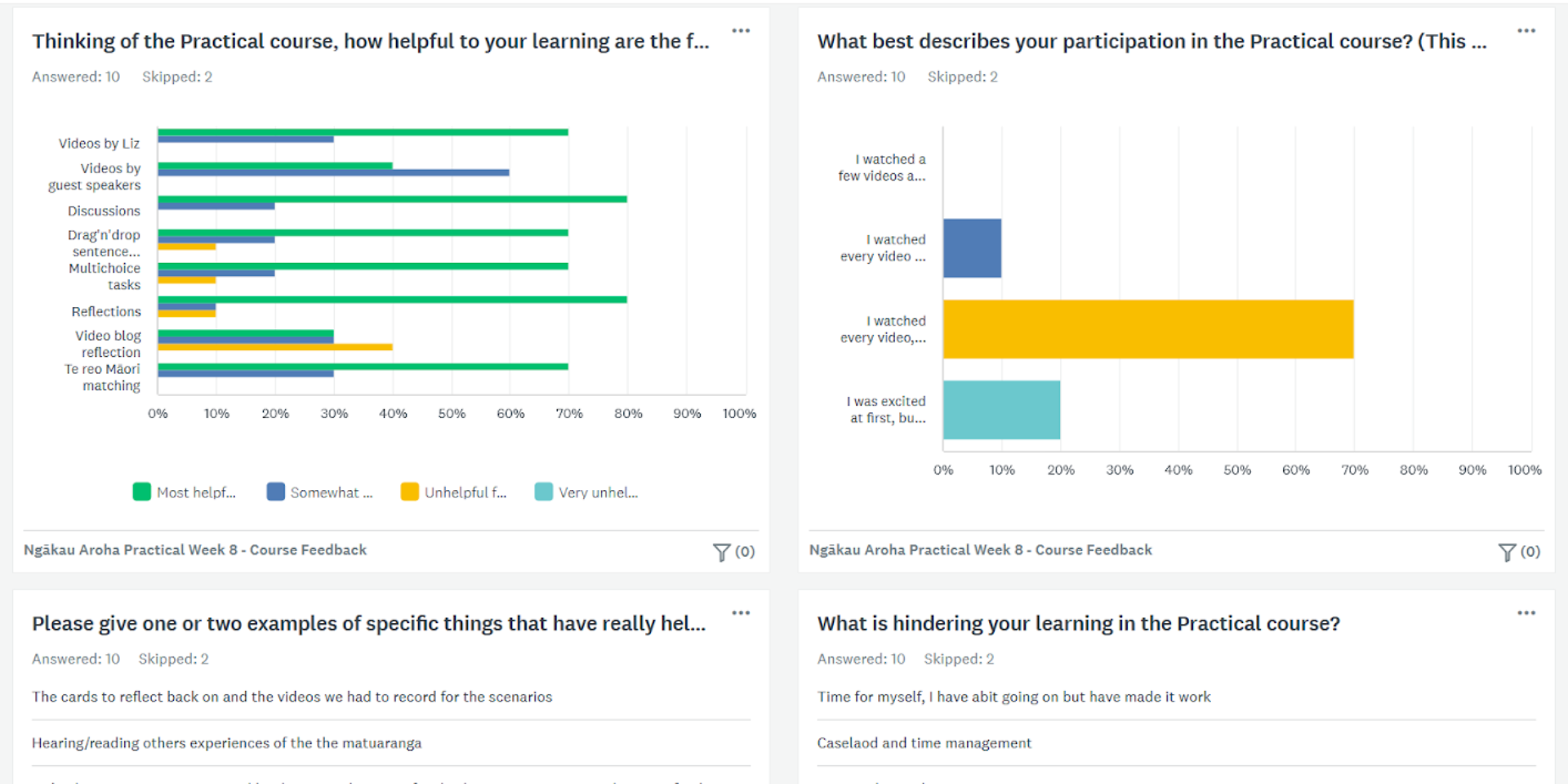
For those looking for an in-app option for polls or rating we have the Pulse feature for facilitators and the Rating task type for authors.
From Liz herself, she says:
“Ngā mihi nui ki a koutou ki roopu o iQualify - Thank you for supporting me on this big journey to bring my kaupapa online, and walking alongside me as it continues to grow and evolve.”
Towards the end of our conversation Liz joked that we’d be hearing from her again in a few months to iterate the reflection task again. “Good!” I said.
“We want to be hearing from our partners about what isn’t working for them. And if it is working… there might be something else to discuss because iQualify will evolve. Something new may work even better!”
So on all counts - learners, facilitators and us - always learning.

